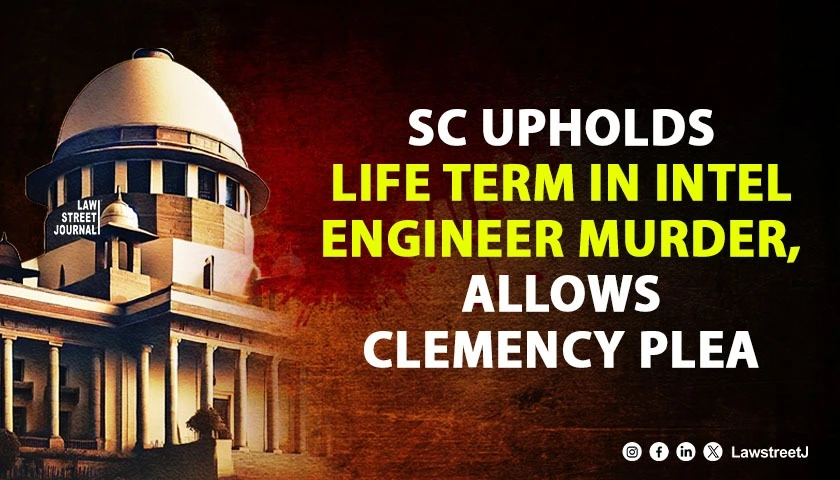NEW DELHI: The Supreme Court has upheld conviction of a law student along with three others, including her boyfriend, for killing her fiance, working as a software engineer in Intel in Bengaluru in year 2003 just days of her engagement, as she was unhappy with it.
Dismissing the appeal, a bench of Justices M M Sundresh and Aravind Kumar permitted the convicts to file petitions before the Governor of Karnataka to seek pardon, by requesting the constitutional authority to consider it, taking note of the relevant circumstances governing the case, including the fact that the offence was caused by unwanted marriage thrust upon the girl.
An appeal was filed by Kum Shubha alias Shubhashankar and others against the Karnataka High Court's judgment, upholding the conviction and award of sentence of life imprisonment upon them.
Having examined the evidence, the court found the link for circumstantial evidence, CDR, showing the girl's continuous communications with the other accused were proved in the case. It also noted the motive for the offence -- an unwarranted marriage thrust upon her -- was also proved with the evidence.
The engagement of the girl took place on November 30, 2003 with B V Girish. Two days after on December 3, 2004, she called up her finance to take her for dinner.
On their way back, they stopped at the “Air View Point” located at the Airport Ring Road to watch the landing of aeroplanes. At that time, the deceased received fatal injuries on his head at the hands of an unknown assailant, who fled after inflicting the injuries, using a steel rod. The deceased died next day in the hospital.
The trial court convicted the appellants and the High Court upheld the judgment.
The court, however, said this unfortunate event would not have occurred, had the family been more sympathetic in understanding the mental predilection and disposition of the appellant girl.
"We cannot condone her action as it resulted in the loss of an innocent life of a young man. We would only state at this juncture, that A-4 (the girl) was made to commit this offence by adopting the wrong course of action in order to address her problem. Years have rolled on since the occurrence of the crime, which was in 2003," the bench said.
The court noted the appellants, who committed the offence with adrenaline pumping in their veins, have now reached the middle age.
"Two out of the four accused persons were teenagers at the time of occurrence...As a court, we seek to view the matter from a different perspective, only for the purpose of giving a new lease of life to the appellants who have committed a heinous crime, notwithstanding the availability of other alternative avenues to resolve the problems faced by the girl," the bench said.
The court granted eight weeks’ time for the appellants to file appropriate petitions seeking to invoke the power of pardon under Article 161 of the Constitution.
"Till these petitions are duly considered and decided, the appellants shall not be arrested and their sentence shall remain suspended," the bench ordered, also noting their conduct in the prison is also not adverse.
“They were not born as criminals, but it was an error of judgment through a dangerous adventure which led to the commission of a heinous crime. It is difficult for us to decide at this stage who influenced the other, although there is a clear meeting of minds,” the court said.
In the judgment, the bench observed, the voice of a young ambitious girl, muffled by a forced family decision, created the fiercest of turmoil in her mind. “This, backed by an unholy alliance of a mental rebellion and wild romanticism, led to the tragic murder of an innocent young man, while simultaneously destroying the lives of three others,” the court said.
The court said a crime constituted a mental rebellion of norms and rules that have been created for the establishment of social order and it can be described as a deviant behavior, triggered by causes which are both distant and immediate.
The bench pointed out that alienation in different forms is one of the major causes for a crime being committed, upon feeling a disconnect from the community, society, or social institutions. “Alienated individuals often feel powerless and neglected, which can lead them to feel rejected by the society and its social norms. The breakdown of social norms contributes to deviant behaviour, especially when individuals lack clear moral guidance from their communities. Since law keeps changing from time to time, what is legal, may not necessarily be moral. Rapid social change, orchestrated by law, often creates conducive conditions for criminal behaviour,” the bench said.
According to the prosecution, Shubha and three others — her friend Arun Verma, Venkatesh and Dinesh — conspired and murdered Girish two days after his engagement on November 30, 2003.















